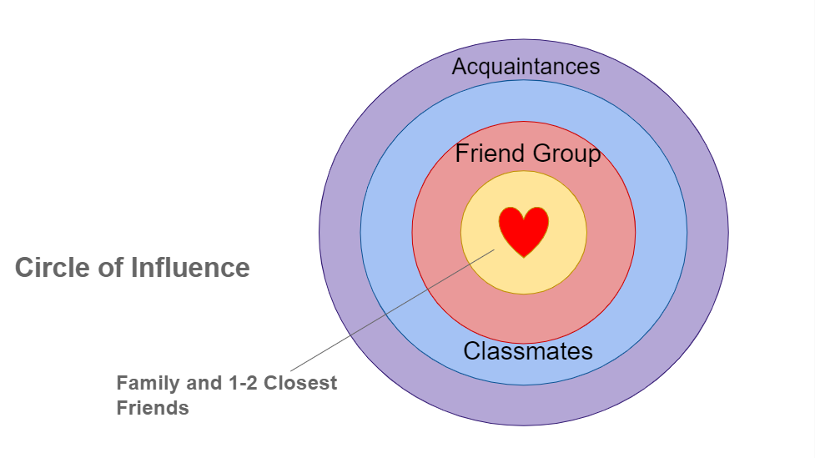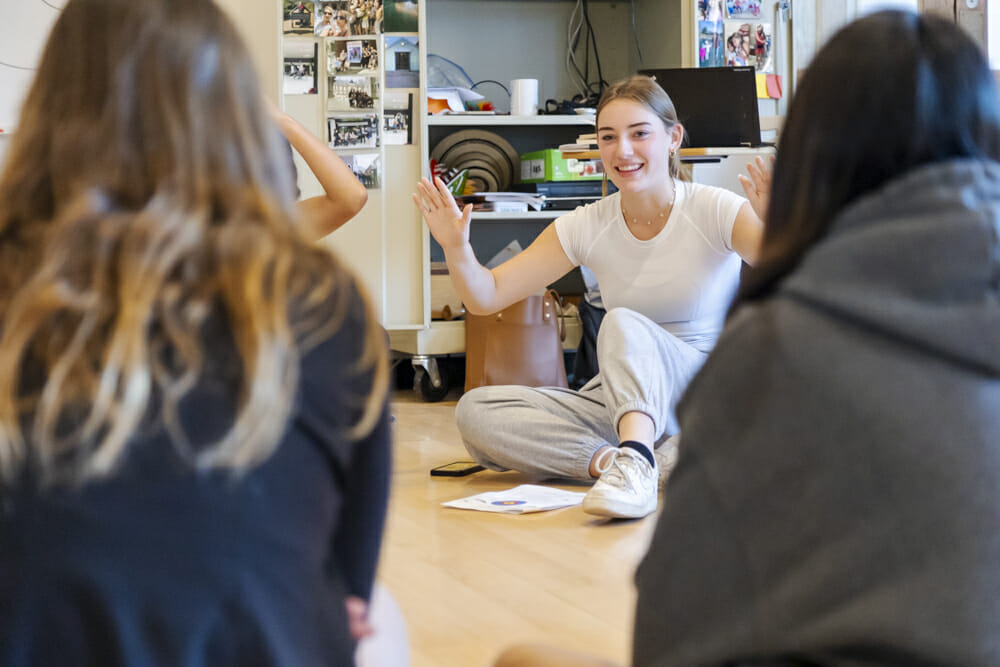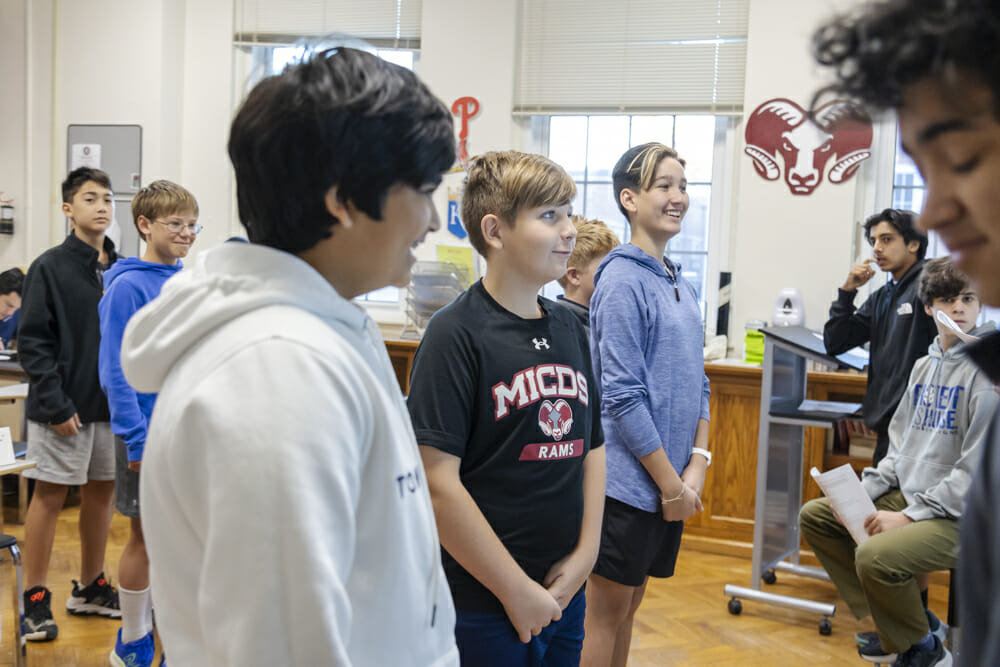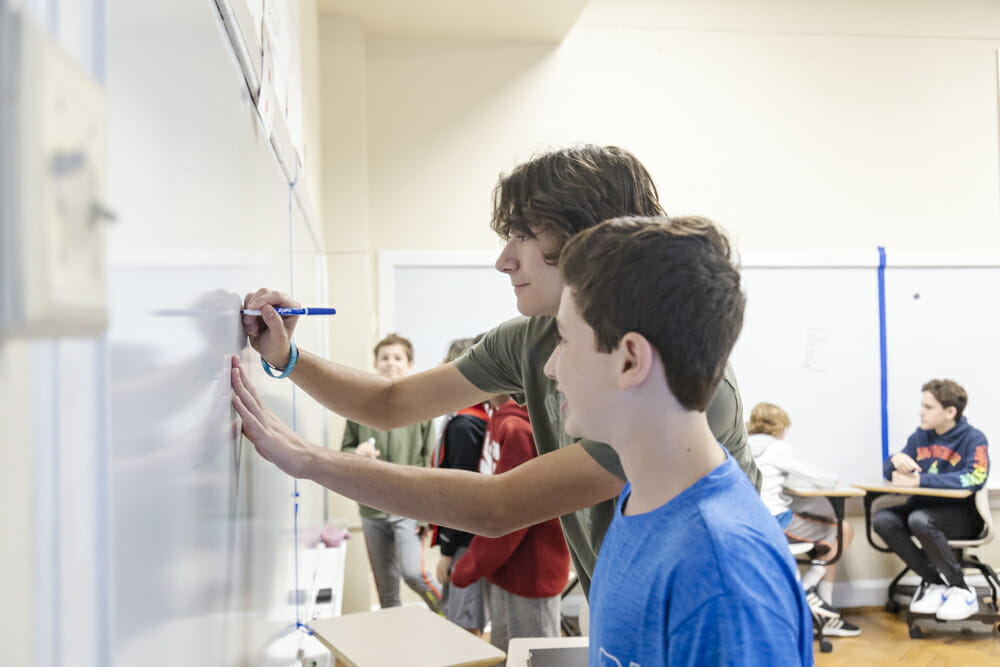Now in its fifth year, the MICDS Upper School Peer-to-Peer (P2P) program has launched its annual cross-divisional connection sessions with Middle School students. The team of 55 Upper School mentors meets six times a year during seventh- and eighth-grade advisory time with a mission that aligns with the School’s: to help Middle School students think critically, act responsibly, and be compassionate. The mentors cover topics such as self-esteem, healthy decision-making, healthy relationships, technology and social media, and more.
After months of preparation on the mentors’ side, where they learn how to lead a session and discuss and develop group norms, one of their main goals is to be authentic when making connections with younger students. All sessions begin with ice-breakers and team-building activities before tackling their pre-determined topic. In addition, they work hard in the sessions to establish a safe space where all voices are heard, confidentiality is offered and honored, and respect for all stories and opinions is paramount.
In the first session, seventh and eighth graders discussed self-esteem and self-confidence. Mentors shared that being happy with who you are, treating yourself with kindness, and not saying things to someone you wouldn’t say to yourself are all things that can positively affect your relationships with others. Next, the mentors led students through the Circle of Influence exercise, which demonstrates how much the presence of others in your circle influences you, from acquaintances and classmates to friends and family and why it’s essential to surround yourself with good friends.
In the second session for seventh graders, students learned the profile of a healthy relationship. Many people have different ways and preferences of connecting, whether in small or large groups, through extracurriculars or sports, or online. Sometimes teens can feel misunderstood by friends or adults, and mentors offered advice on handling conflict, such as standing up for themselves or others. Next, they dug into setting boundaries such as protecting your time, saying no, not wanting to engage in gossip or mean-spirited conversations, making decisions, sharing when you feel hurt, or respectfully disagreeing.
As a P2P co-head, Mia Krieger ’24 wanted to be a mentor because she remembers how much she looked up to her advisory mentors when in seventh and eighth grade. “I really enjoy hearing about students’ struggles and small inconveniences in Middle School, because I remember when I was going through the same thing,” she said. “I like sharing with them about high school and answering all of their questions.”
Sanchi Vishwakarma ’23 also felt driven to this program to serve younger students and help them navigate life at MICDS. “I enjoy being able to connect MICDS across school divisions and being able to support students through middle school and high school. Sometimes, we have difficult conversations, which many try to avoid, so we try to make it engaging,” she said.
P2P co-head Noah Macam ’23 added, “P2P offers the opportunity to give authentic, real, and valuable advice to Middle School students that teachers, counselors, and even parents are unable to give. Middle Schoolers really look up to the Upper Schoolers, and the program helps them feel more comfortable as they make their transition into high school. Our program also does a nice job of connecting Upper School students between upper/lower classmen, which I think is a strong suit.”
In the second eighth-grade session, the mentors gave a crash course on time management, collaboration, and relationships with teachers. Most eighth graders by now know how to contact their teacher or advisor when they have a question, but there is more nuance to the process when in Upper School. They offered tips on preparation, what to say and how to say it, being efficient and respectful of the teacher’s time, and who can help them if the teacher isn’t available. In addition, they spoke to the ever-present challenge of thriving in school, athletics, and activities without overdoing it and how to plan and make room for balance through exercise, sleep, disconnecting from technology, and letting go of perfection.
Macam looks forward to the random questions he and his mentor team field during the sessions. “Anything from the hardest classes in the Upper School, college admission process, cell phone policy, rating school lunches, relationship advice, etc. The unpredictability of the Middle Schoolers makes it really fun,” he said. “Some of my favorite sessions over the years have been about social relationships, balancing academics in Upper School, and the types of classes, clubs, activities, and sports offered in the Upper School.”
The good intention and efforts of the mentors do not go unnoticed. Amey Parwal ’27 likes the learning experience of P2P because “The Upper Schoolers have been through middle school, so they know what people can be like, and they teach us what to expect in the Upper School.” Max Padratzik ’27 added, “Interacting with Upper Schoolers has helped me get insight on what the Upper School is going to be like both academically and socially.” Abby Selner ’28 appreciates connecting with older students, asking questions, and learning from them. She said, “It’s a great time to talk to people closer to our age rather than always talking to adults.” Rylee Day ’28 thinks this program is great from a problem-solving perspective, and said, “I really enjoy having conversations with the Upper Schoolers. I was really surprised by how open-minded and kind they are. I feel as if my P2P mentors could be great friends with my advisory and do fun activities with a happy and positive attitude. I think the Upper Schoolers coming down to talk with us is a great idea because if I have any social, school, or family problems, we can talk about it. I like that we can share personal things (optionally) without getting judged or made fun of. I am really looking forward to the next P2P meeting in my advisory!”
Andrew Li ’28 appreciates the advice and new perspectives from older students. “I learned about homework in Upper School, and when you can take AP classes, so I know when to prepare.” Lillian Ott ’28 enjoys the support of having older peers. “Talking to someone who went through what we are going through more recently can provide advice for us that might be better than an adult’s advice,” she said. “I have benefitted from Peer-to-Peer by understanding more situations and different types of relationships so that I can connect with people more.” Max Jacoby ’28 thinks P2P is a great way to get Middle School students ready for what high school will be like. “It is a great way to get advice from the high schoolers about what to do if you’re having trouble in middle school or if you need some advice about friends or teachers you can always ask them. Overall, P2P is an amazing program and also a big help,” he said.
In future sessions, mentors and mentees will discuss unhealthy relationships and boundaries, offer pro tips on registering for Upper School classes, and address mental health, consent, and peer pressure. They will also participate in “Ask Me Anything” sessions on transitioning to Upper School and, of course, a celebration at the end of the year for leaving a strong, positive legacy for others.
Co-head Abby Wyckoff ’24 shared, “I love being able to share my own experiences and help Middle School students face challenges that I remember dealing with when I was their age. It’s always so fun talking and hanging out with our mentees, and I really think that we do a good job of creating a safe space where they feel comfortable to share and learn and grow with each other. I hope that our mentees feel better prepared for Upper School life and know that they can always turn to us for anything and everything.”
Krieger added, “I have been pleasantly surprised this year as to how many students are willing to participate in the program and share their ideas with the class instead of just being silent. I feel like the program has grown so much over the past few years and I’m so excited to see where it goes!”
Director of Student Support Services Vicki Thurman oversees the program, ensuring mentors are trained and ready to go, and that the curriculum is clear and organized. She said, “Having had the privilege of sponsoring this program for five years, I am constantly impressed with the commitment and enthusiasm the Upper School students bring to each session. Over these years, the program has improved due to input from not only the Upper School mentors but also from Middle School students. Seeing the strong cross-divisional bonds that build during the school year is one of the most meaningful opportunities I have the privilege to witness and foster at MICDS.”
Thank you, Upper School peer mentors, for helping MICDS build connections within its JK-12 community!





































































